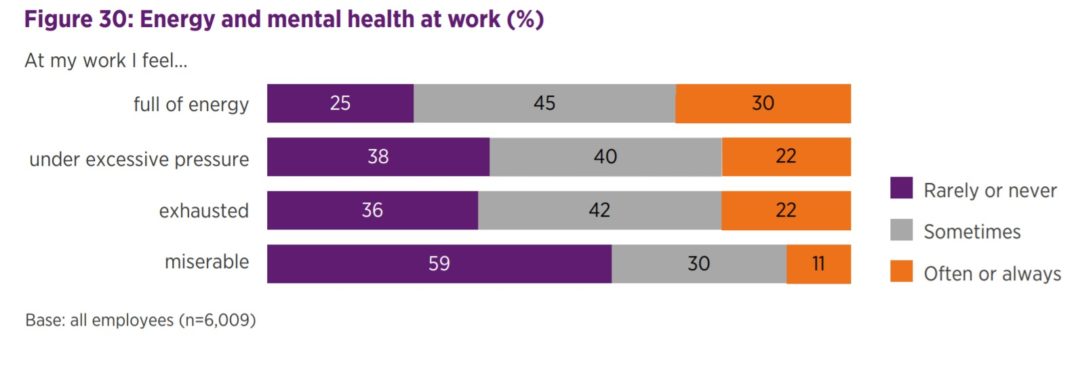Last week saw the release of the UK’s first comprehensive measure of UK job quality, the CIPD’s UK Working Lives survey report 2018. In this blog, CIPD’s Employee Relations Adviser, Rachel Suff, gives an overview of the main findings.
The CIPD UK Working Lives survey report 2018 finds that health and wellbeing is the single biggest driver of job quality in UK workplaces. This isn’t surprising – if a job is designed in such a way that it has an adverse impact on someone’s mental or physical health, this is likely to have a defining effect on how happy they feel. This is borne out in the survey findings which show that the impact of job in quality in terms of people’s health and wellbeing has a bearing on their day-to-day enthusiasm for the job, work effort and whether or not they intend to stay with the organisation.
The survey explores the overall impact of work on physical health, the incidence of physical health conditions due to work and levels of energy or exhaustion at work, as well as the overall impact of work on mental health including the incidence of anxiety of depression due to work, and whether people feel stressed or miserable at work. Overall, work tends to have positive impact on people’s health and wellbeing and more people feel ‘full of energy’ at work (30%) than rarely or never feel this way (25%).

Caught in the middle
Of all the different occupational groups, middle managers are the most stressed and overworked. Although job satisfaction among this group is relatively high, middle managers are the most likely to say their workload is unmanageable and almost a quarter (24%) say they are always or often under excessive pressure at work. Middle managers are also more likely to say their work negatively affects their mental health: 27% compared with 22% of skilled and unskilled manual workers and senior management.
It’s not surprising that many middle managers feel their health and wellbeing is adversely affected at work – not only will they have operational targets and deadlines to meet, they are often not given the training and resources needed to be effective people managers.
Boosting support for health and wellbeing – and for managers
Our findings show that organisations need to take action on a number of fronts to enhance people’s health and wellbeing, particularly in the case of middle managers. Workload is well recognised in our own research as the major cause of work-related stress, and managers should have regular conversations with people in their team about whether targets and deadlines are achievable and workloads are manageable. Every organisation has a legal duty to carry out a stress audit or risk assessment and the Health and Safety Executive (HSE) has a range of practical tools and resources to help organisations to carry out and record a risk assessment.
It’s also essential that organisations invest in their managers, by providing ongoing and effective people management training and support. Too often, people are promoted into managerial jobs and not given the necessary training, with people management viewed as an ‘add-on’ to their operational role rather than intrinsic to it.
Good line management can help prevent work-related stress, by managers being alert to changes in people’s behaviour and having sensitive conversations with people when needed. They cannot be expected to be medical experts but they do need to have the confidence and competence to spot the early warning signs of ill health, signpost people to more expert sources of support when needed, keep in touch with people if they are off sick and make appropriate adjustments for people to manage an illness or return to work. If they are not adequately equipped for this role, managers’ own health could be in jeopardy – which is very likely why our survey reveals middle managers as the ‘squeezed middle’ in relation to the health and well-being dimension of job quality.
